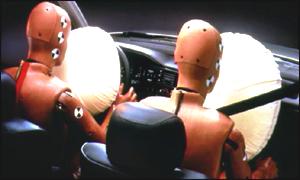|
|
|
|
Front Page |
|
|
World |
|
|
UK |
|
|
UK Politics |
|
|
Business |
|
|
Sci/Tech |
|
|
Health |
|
|
Education |
|
|
Sport |
|
|
Entertainment |
|
|
Talking Point |
|
|
In Depth |
|
|
On Air |
|
|
Archive |
|
|
|
|
|
|
|
|
|
|
|
Feedback Low Graphics Help |
|
Tuesday, August 31, 1999 Published at 22:41 GMT 23:41 UK
Health
Whiplash 'could cause Alzheimer's'

The whiplash caused by car accidents could lead to Alzheimer's
Research showing how sudden head movements - such as those caused by car accidents - can cause Alzheimer's Disease is helping scientists unlock the secrets of the illness.
|
|
|
| BBC News' Christine McGourty: Even small head injuries can cause disease years later |
But a team at the University of Pennsylvania is claiming to have found the first physical evidence that even "non-contact" injuries can trigger Alzheimer's.
The sudden change of direction caused by a violent jerk crashes the brain into the skull wall, damaging sensitive nerve fibres and setting in motion a chain reaction.
Seatbelt campaigns urged
This could mean that even injuries caused by whiplash might lead to Alzheimer's, although perhaps not until old age.
The study's authors suggest societies should try harder to encourage the use of seatbelts in cars and helmets by bicycle and motorcycle riders.
In the experiments, pigs were anaesthetised, then forced through very rapid acceleration or deceleration movements.
Dr Douglas Smith, who headed the team, said: "Our study suggests that even moderate brain injury resulting from a tremendous change in velocity can cause axonal damage sufficient to launch an insidiously progressive degenerative process."
![[ image: Damage to nerves causes a chemical chain reaction]](Whiplash_could_cause_Alzheimer-filer/_434695_brain_normal150.jpg) |
| Damage to nerves causes a chemical chain reaction |
Dr Richard Harvey, director of research, said: "There are so many other good reasons that we should protect our heads. The brain is a sensitive organ which does not repair itself."
The researchers had found that damaged nerves secreted a substance called A-beta, which is known to help cause the future degeneration of brain tissue.
Search for vaccine
Dr Harvey said this was an "exciting" finding: "It's something that we believed happened, but this is the first study which has actually found that these chemicals are produced."
Other work on laboratory mice is already taking place to find ways to train the body's immune system to neutralise the chemicals which cause Alzheimer's.
This would open the door for a vaccination to protect younger people from a disease that might not manifest itself until much later in life.
Earlier studies have found that blows to the head can lead to Alzheimer's even decades afterwards, although minor injuries are not thought to cause it.
The condition, which affects millions worldwide, brings irreversible cognitive decline, loss of memory, changes in behaviour and reduced motor skills.
Health Contents
|
|
Relevant Stories 04 Aug 99 | Health Immune system 'worsens Alzheimer's' 05 Mar 99 | Health Alzheimer's drug success 16 Feb 99 | Health Drive to beat Alzheimer's Disease |
|
|
Internet Links |
|
|
Alzheimer's Disease Society Alzheimer's Disease Education |
|
|
The BBC is not responsible for the content of external internet sites. |